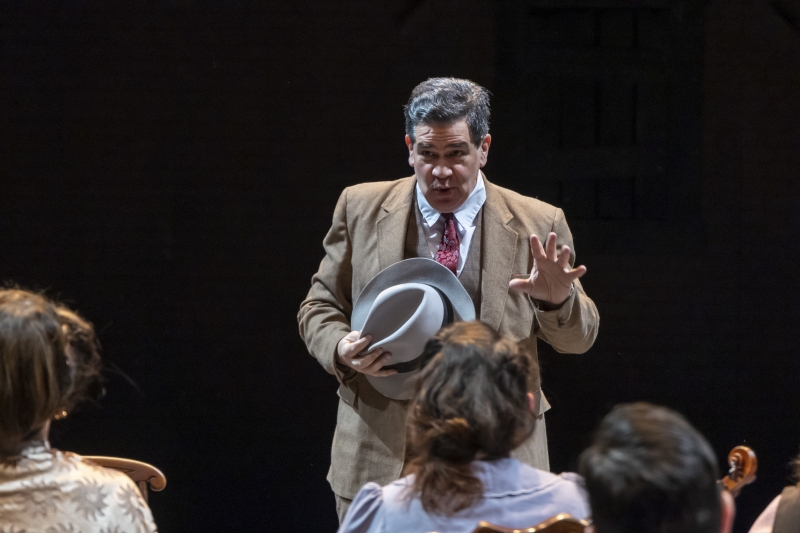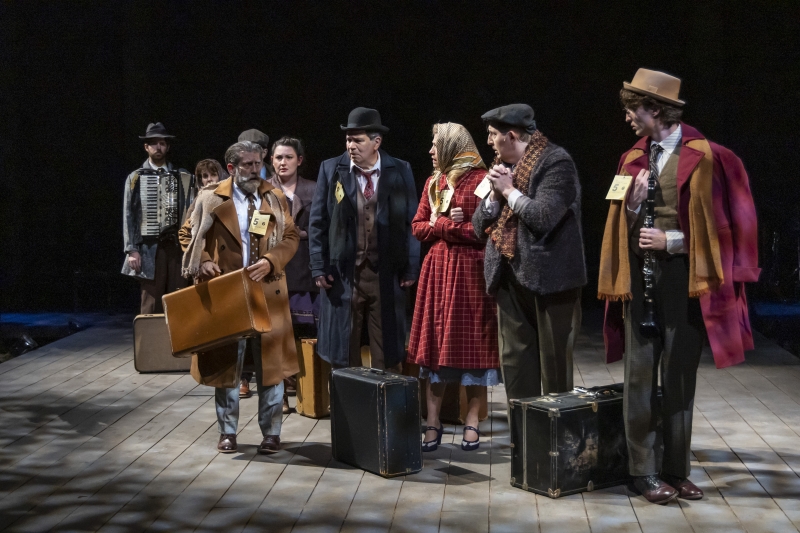Paula Vogel's INDECENT Is Nashville Repertory Theatre's Best Production of The Last 10 Years
Company's First Production of 2024 is 'Sumptuously Mounted and Sublimely Acted'

If, like me, you continue to be haunted by images from Paula Vogel’s play Indecent long after the final curtain, chances are you will compare two moments in time depicted in the play now onstage at the Andrew Johnson Theatre that are disturbingly familiar and eerily similar. In one, after a long voyage across the Atlantic, a slow-moving queue of anxious emigres await their turn to be seen by officials on Ellis Island, in hopes of being allowed to start the long and arduous process of becoming new Americans. In the other, less hopeful and certainly more tragic (if only by degrees), the people on-line trudge silently and courageously to their certain death in a Nazi concentration camp. That it is difficult to tell the difference between the two rows of people and what the end results might be underscores the reality of both queues and the life and death decisions that are a part of each.
 It is a chilling reminder of the hardships of life, the capricious nature of humankind and the cruelty to which people are still subjected today. And that, quite frankly, is why you should make it a point to see Nashville Repertory Theatre’s stunning production of Indecent, which is at once warmly amusing, heartbreakingly authentic and horrifically prescient more than a century after many of the events depicted took place.
It is a chilling reminder of the hardships of life, the capricious nature of humankind and the cruelty to which people are still subjected today. And that, quite frankly, is why you should make it a point to see Nashville Repertory Theatre’s stunning production of Indecent, which is at once warmly amusing, heartbreakingly authentic and horrifically prescient more than a century after many of the events depicted took place.
Onstage through Sunday, February 11, at Tennessee Performing Arts Center’s Johnson Theatre, Nashville Rep’s Indecent is a sumptuously mounted and sublimely acted production, directed by the company’s artistic director Micah-Shane Brewer and featuring a ten-member ensemble who bring more than 40 different characters to vivid life over the course of the one-hour-and-45-minute play that is presented without intermission. Without question, Nashville Rep’s Indecent is the best and most satisfying production offered by the company in the past decade. Though not a particularly well-known title among casual theatergoers, it is nonetheless the type of meaty offering that “theater people” delight in sinking their teeth into, which may be read as “a hard sell” for general audiences.

Brewer and his exemplary cast of actors – and the creative team who provide them with everything they require to present a truly exceptional piece of theater – imbue Indecent with palpable energy and commendable vigor. They thoroughly eschew the temptation to go over the top in their portrayal of the characters and their heartrending stories, instead delivering a play that fairly rings with authenticity and remains loyal to the memories of those long-dead individuals who gave of their souls to create the story being interpreted herein. They never overact (they refuse to gild the lily, as it were), which would push the play in which they are cast into the realm of pedantic melodrama.
Vogel’s Indecent is a play within a play within yet another play – the feeling is not unlike the continued discovery of smaller dolls from within their hiding places in a Russian matryoshka doll, which symbolizes the chain of maternal connection from one generation to the next, which seems especially relevant in a Jewish story – that takes audiences on a circuitous fact-finding tour to learn about the events surrounding the 1923 production on Broadway of Polish-born, Jewish playwright Sholem Asch’s scandalous and acclaimed play, God of Vengeance, following along from its first reading in a salon in 1907 Warsaw to America during the time of the Red Scare of the 1950s.
While Vogel’s consideration of the history of God of Vengeance is fascinating in and of itself, Indecent is quite possibly more noteworthy thanks to its depiction of its impact on the history of the theater, writ large, including the confluence of Jewish culture and homosexuality in a timely production.

Not only does Indecent relate the history of Asch’s play and his subsequent writing career (although he was already an established rising star in Yiddish literature by the time of the first production of God of Vengeance), but it’s also a riveting, even captivating, account of the people whose lives are irrevocably changed by their association with the melodrama at its center. Vogel’s play challenges audiences to consider all their preconceived notions about bias, prejudice and privilege, to wrestle with the notion of what constitutes art and invests in it the ability to transform and to transport, and to ascertain that which may be called “obscene” when it is presented for consumption by a discerning public – and, perhaps more importantly, what makes people who haven’t experienced something for themselves to refer to “it” as obscene.
After its debut at the Warsaw salon in 1907, Asch’s God of Vengeance was produced to audience and critical acclaim, despite outcries from some members of the Jewish intelligentsia that it portrays their community at its worst. In Asch’s play, a relatively well-off Jewish family seeks to make a good marital connection for their only daughter, hindered by the fact that their fortune comes from the brothel downstairs from their apartment. When her parents plot to marry her off, the daughter reveals that she has fallen in love with one of the prostitutes downstairs, leading her father to curse her, destroying a Torah he had commissioned to watch over the teenaged Rivkele.

Considered scandalous and profane by some for its sexual themes and the desecration of a Torah, Asch’s play was equally derided by others for its stereotypical characters. To his credit, however, Asch’s work was venerated for its candid depiction of hypocrisy, both social and religious, and its depiction of inherent parent/child conflicts.
As Indecent presents the story of the play’s productions (it toured all over Europe, winning fanatic followers from St. Petersburg to Vienna, from Constantinople to Berlin), we watch as the playwright’s personal fame similarly accelerates and plans are made to bring the show to America, where audiences in Greenwich Village are likewise impressed by the story, which leads to producers’ decision to move the show uptown to Broadway. When revisions are made to the script in hopes of making it less incendiary on the Main Stem than it was downtown, the stage is set for the scandal that accompanied the first onstage lesbian kiss in Broadway history.

Needless to say, Vogel’s script is not documentary evidence of actual events, so there are some fictional elements that cloud the truth of God of Vengeance on Broadway: the play was running for six weeks before it was closed down for its “obscene, indecent, immoral and impure material.” With the same present-day actors portraying all the actors in all the productions of the play represented within the play, there may be some confusion about the fate of the people represented onstage. For example, famed Austrian actor Rudolph Schildkraut, who stars as the domineering father, did not die in a concentration camp. Rather, he died in Hollywood in 1930 (his son, Joseph Schildkraut later starred as Otto Frank in the original film treatment of The Diary of Anne Frank).
There are five more opportunities to see the provocative work before it disappears into the ether. Brewer’s cast features some of Nashville’s most beloved actors (Rona Carter, Garris Wimmer and Galen Fott) together with newer personalities (Sarah Aili and Dustin Davis) and two who have grown up on local stages only to venture further afield and who are now given roles that truly speak to and of their talents (Delaney Amatrudo and Thomas DeMarcus), and three musicians (Trevor Targowski, Lauri Canaan and Eric Sorrels) who provide the accompaniment that enlivens the production, infusing Indecent with a fillip of musical theater bravado that renders the production less funereal than it might be otherwise.
 Although there is much darkness in the play – there is no way to consider Jewish themes in the first half of the 20th century without those moments – there is much light and levity to be found in Indecent, and Brewer’s sensitive direction allows his actors to mine those moments for poetry and laughter, while plumbing the depths of loss and heartache in other scenes. Every actor is honest and forthright in their portrayals, without any mawkish sentimentality or over-enthusiastic over-acting to mar their performances.
Although there is much darkness in the play – there is no way to consider Jewish themes in the first half of the 20th century without those moments – there is much light and levity to be found in Indecent, and Brewer’s sensitive direction allows his actors to mine those moments for poetry and laughter, while plumbing the depths of loss and heartache in other scenes. Every actor is honest and forthright in their portrayals, without any mawkish sentimentality or over-enthusiastic over-acting to mar their performances.
As Lemml, the stage manager whose life is changed totally and completely on the night Asch’s play is first read in a Warsaw literary salon, DeMarcus provides the very heart and soul of Indecent, giving voice to every individual who has ever found their true home within the confines of a theater. He serves as the conduit through which each audience member is allowed entrance into the rarefied space that so eloquently expresses the importance of art and its creation. As he breaks the fourth wall that separate players and audience, DeMarcus’ Lemml introduces each member of the troupe, throwing open the doors to the inner sanctum to create a sense of intimacy that is dazzling and deeply felt.

Amatrudo, as “Chana, the Ingenue,” is finally given a role worthy of her estimable talents and she makes the most of the opportunity to create an unforgettable role that seems as if it is written expressly for her. She is paired, most often, with Sarah Aili as “Halina, the Middle,” who is given the script’s weightiest lines: “I would not be ashamed to be arrested for acting in the play I believe in. I am ashamed I acted in this sham I don’t believe in.” In her passionate delivery, the words have a shattering impact, packed with meaning beyond the page upon which they are written.
As is to be expected, Carter, Wimmer and Fott put every item in their actor’s arsenal of dramatic weapons to good use, creating a variety of individuals with whom to entertain and to delight, to educate and to illuminate.

The performance of Dustin Davis, who plays the young Sholem Asch, is revelatory, showing a depth and breadth heretofore untapped on a local stage. Charming and engaging, he wins over every doubter – whether in the playscript or in the audience – which makes his character’s later refusal to come to the aid of the company when they are arrested on charges of obscenity all the more potent and repugnant. Davis plays his character with subtlety, somehow managing to infuse him with a sharpness that is at once shocking and totally believable.
Targowski, Canaan and Sorrels not only play the incidental music created for the play with confidence and a palpable sense of theatricality, but they seamlessly become integral parts of the ensemble whenever the action requires it. They are as much a part of the story being told as are the actors.

Brewer’s direction and choreography keeps the play’s action moving at a cinematic clip. In fact, when one rises during the curtain call to pay homage to the ensemble’s impressive performance, one will be surprised by how quickly the evening has gone. Musical director Randy Craft once again proves his tremendous talent by ensuring the music dovetails perfectly into the schema of the production.
Gary C. Hoff designs the thrust stage that allows a panoply of historic settings to be presented, while Heather McDevitt Barton’s costume, hair and makeup design allows each actor to assume the mantle of the character he or she might be playing at any given moment. Phillip Franck’s lighting design is both atmospheric and theatrical, creating dual worlds of history and make-believe, and Lauren Yawn’s properties design provides the period-perfect minutiae of lives in transition.
 Dramaturg Howard Snyder is worthy of praise for the role he plays in helping the ensemble feel confident in their roles as Jews traveling through the harsh world of the early 20th century.
Dramaturg Howard Snyder is worthy of praise for the role he plays in helping the ensemble feel confident in their roles as Jews traveling through the harsh world of the early 20th century.
Indecent. By Paula Vogel. Score and original music by Lisa Gutkin and Aaron Halva. Directed and choreographed by Micah-Shane Brewer. Musical direction by Randy Craft. Stage managed by Isaac Krispin. Technical direction by Chelsea Flowers. Dramaturgy by Howard Snyder. Presented by Nashville Repertory Theatre. At Andrew Johnson Theatre, Tennessee Performing Arts Center, Nashville. Running time: 1 hour, 45 minutes, with no intermission. Through Sunday, February 11. For details, go to www.nashvillerep.org.
Comments

Videos

